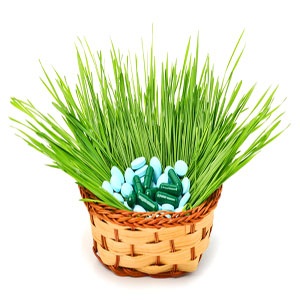
Not too familiar with chlorella? Brush up on the facts – these brilliant algae may be just what the doctor ordered.
Chlorella is a single-celled, deep-green, fresh-water alga, which is now grown mostly in Taiwan and Japan. It’s reputed to have detoxification properties, to be effective as an antioxidant, to boost the immune system and to help fight infection, among other things.
Chlorella contains a high concentration of chlorophyll and, although the dried preparation of chlorella can vary enormously in content from crop to crop, its protein content can be as high as 88%, making it a fantastic source of protein in the diet of vegetarians.
Read: Chlorella
In its natural form, chlorella has a tough outer cell wall, making the nutrients inside the cell difficult to absorb. For this reason, it’s mostly available in tablets and liquid extracts.
Background and history
Chlorella, which emerged as long as 2 billion years ago, is one of the oldest forms of plant life on earth.
In 1890, a Dutch microbiologist, Prof M.W. Beijerinck, managed to grow a culture of chlorella in his laboratory, but it wasn’t until the 1940s that chlorella was studied closely.
German physiologist Otto Heinrich Warburg was awarded the Nobel Prize in Physiology or Medicine in 1931 for, among other things, his studies on photosynthesis in chlorella. In 1961, Melvin Calvin of the University of California was awarded the Nobel Prize in Chemistry for his research on the pathways of carbon dioxide assimilation in plants using chlorella.
Read: History of the vitamin industry: part 1
Chlorella multiplies rapidly, and has a high protein, fat and vitamin content – and it was for this reason, when there were fears of an uncontrollable population boom in the 1940s and 1950s, that people thought chlorella might solve the expected food crisis. But, in the end, the food problems were solved by means of better crop efficiency and not from chlorella.
Today, chlorella is cultivated in large circular ponds and mostly used for medicinal purposes.
The health benefits
The benefits of chlorella haven’t been conclusively proven, but it’s said to have the following health benefits:
How to include chlorella in your diet
Chlorella is available in powder form, tablets and capsules. It can be bought at health shops, and in Australia, also online.
Read: History of the vitamin industry: part 2
The powder can be sprinkled on food, or taken with water or juice half an hour before meals.
Take note: Always speak to your doctor before starting to take chlorella and be sure to follow the instructions on the packaging.
Read More:
History of the vitamin industry: part 3
'Superfoods' everyone should eat
Coconut – the 'fruit of life'
Image: Chlorella pills, tablets and grass in a basket from Shutterstock.
Sources: Chorella:greenessentials.com; WebMD; Herb wisdom; Healthyplanetcanada.wordpress.com; Green Nutritionals
Chlorella contains a high concentration of chlorophyll and, although the dried preparation of chlorella can vary enormously in content from crop to crop, its protein content can be as high as 88%, making it a fantastic source of protein in the diet of vegetarians.
Read: Chlorella
In its natural form, chlorella has a tough outer cell wall, making the nutrients inside the cell difficult to absorb. For this reason, it’s mostly available in tablets and liquid extracts.
Background and history
Chlorella, which emerged as long as 2 billion years ago, is one of the oldest forms of plant life on earth.
In 1890, a Dutch microbiologist, Prof M.W. Beijerinck, managed to grow a culture of chlorella in his laboratory, but it wasn’t until the 1940s that chlorella was studied closely.
German physiologist Otto Heinrich Warburg was awarded the Nobel Prize in Physiology or Medicine in 1931 for, among other things, his studies on photosynthesis in chlorella. In 1961, Melvin Calvin of the University of California was awarded the Nobel Prize in Chemistry for his research on the pathways of carbon dioxide assimilation in plants using chlorella.
Read: History of the vitamin industry: part 1
Chlorella multiplies rapidly, and has a high protein, fat and vitamin content – and it was for this reason, when there were fears of an uncontrollable population boom in the 1940s and 1950s, that people thought chlorella might solve the expected food crisis. But, in the end, the food problems were solved by means of better crop efficiency and not from chlorella.
Today, chlorella is cultivated in large circular ponds and mostly used for medicinal purposes.
The health benefits
The benefits of chlorella haven’t been conclusively proven, but it’s said to have the following health benefits:
- Helps the body to get rid of toxins.
- Reduces the side effects of radiation and chemotherapy.
- Reduces the symptoms of fibromyalgia.
- Helps with alkalisation of the body.
- Functions as an immune-system booster and fights infection.
- Increases the good bacteria in the digestive system, helping to treat Crohn’s disease, diverticulosis and colitis.
- Helps to treat constipation, high blood pressure and high cholesterol.
- Protects against the development and spread of cancer.
How to include chlorella in your diet
Chlorella is available in powder form, tablets and capsules. It can be bought at health shops, and in Australia, also online.
Read: History of the vitamin industry: part 2
The powder can be sprinkled on food, or taken with water or juice half an hour before meals.
Take note: Always speak to your doctor before starting to take chlorella and be sure to follow the instructions on the packaging.
Read More:
History of the vitamin industry: part 3
'Superfoods' everyone should eat
Coconut – the 'fruit of life'
Image: Chlorella pills, tablets and grass in a basket from Shutterstock.
Sources: Chorella:greenessentials.com; WebMD; Herb wisdom; Healthyplanetcanada.wordpress.com; Green Nutritionals




 Publications
Publications
 Partners
Partners













